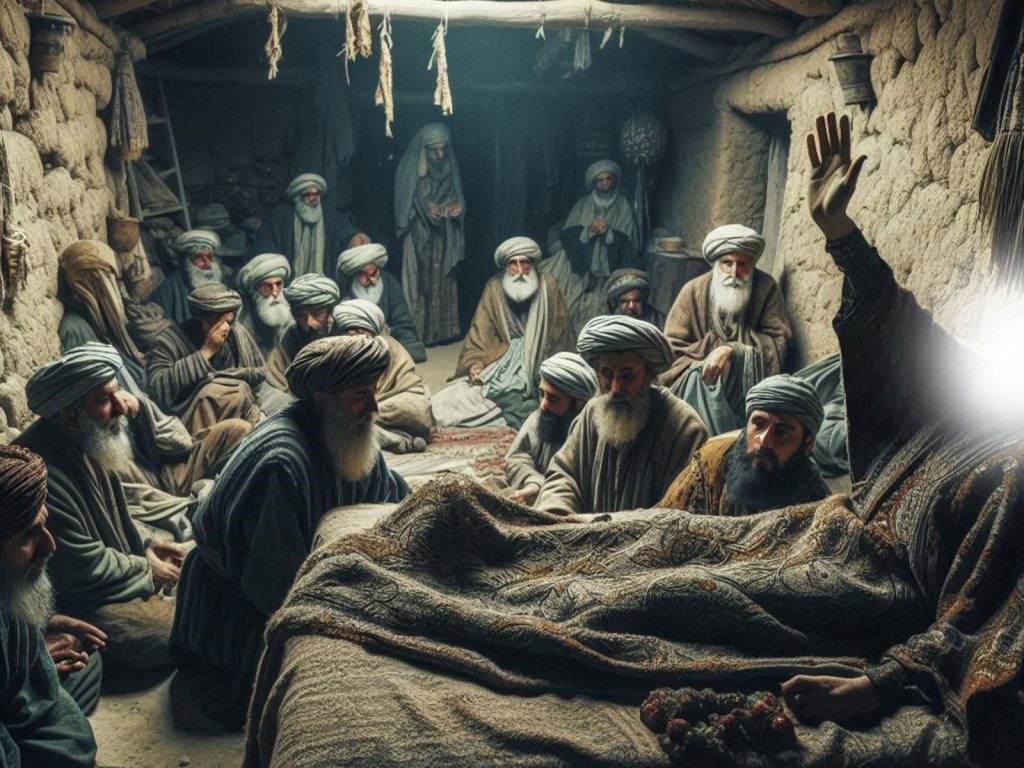We have frequently heard the stories of the fathers who gather their children in their last moments of their lives giving them advice. In their last hours, they tend to pass the essence of their life like an invaluable treasure to their descendants and inherit them with a precious heritage.
In our religious teachings, the Great Prophet (PBUH&HP) is regarded as the father of Ummah (nation) [1], a father who has fallen to the bed of illness after 63 years of strive, in days similar to these…
One of these days, he heard the sound of crying. He asked for the reason; they replied: “People, men and women of the Immigrates (Muhajirin) and the Helpers (Ansaar) have gathered in the mosque, and cry as they are worried for you.”
Although he has lost his strength; although in hours his high spirit will rest in the heavens of God’s mercy; if he is the father and the Muslims are his children, and they are going to experience the bitter taste of being orphans, the father is more worried. Therefore he said: “take me to the mosque so that I see them and they see me too.”
Amir al-Mu’minin (PBUH) and Fazl ibn Abbas together helped him to stand up. The kind father of the nation who could no longer stand on his feet, with the help of Amir al-Mu’minin (PBUH) and Fazl ibn Abbas, entered the mosque while his feet were drawn on the ground, wearing a garb and a bandana on his head. When the people saw him in this situation, they started to cry and grieve.
After sitting on the first step of the pulpit, he started to praise and thank God; after that he said: “I see you are worried for me. Has anyone lived forever? I am not an exception. O people! I am the premier of your caravan (and I am leaving first). You will come after me, and you will join me beside the pond of Kawthar.
Pay attention! I will question you about the Thaqalayn (the Two Weighty and Important things) that how you will have treated them. I will leave these Thaqalayn with you – the Book of God and my Itrat (Household); do not accelerate them for you will suffer from lack of leadership and you will disperse. And do not be left behind, for you will get lost and you will be annihilated. Do not try to teach them for they are wiser than you…”
However, the Prophet of God (PBUH&HP), in those moments, opened the eyes of his nation to another truth as well:
“O people! Beware that the only mean, between God and the humans, that brings about good and takes away vice is practicing the religion of God… I swear to the One Who has rightly appointed me as the prophet, nothing will lead to man’s salvation except action, an action which is attached to the mercy of God.”
Afterwards, in order to show the seriousness of his points, he added a remarkable statement: “Even if I disobey, I will fall!”
At the end, to make his words endurable, he asked for God’s attestation: “O God, be witness that I delivered your message.”[2]
Thusly the session of the farewell with the nation ended, and the Great Prophet (PBUH&HP) left for his house, and placed in the bed of illness, and he never recovered.
It was the last moments of his life that he ordered everybody to exit the room. The companions and his wives all exited. He wanted Fatimah, Ali and their children (PBUT) to be with him. They came and sat beside his bed.
At that moment, he took Fatima’s (PBUH) hand and put it on his chest. He wanted to speak, but he burst into tears. He silenced for a moment. His dears were weeping. After relaxing a little bit, he put Fatima’s (PBUH) hand into Ali’s (PBUH) and said: “Ali! This is the deposit of God and his Prophet that I leave you with…”
The father of nation, worried for his children, deceased after some moments. In his last hours, as we noticed, he addressed his nation with two important wills: from one hand, he specified the correct path forever with his heritage; and on the other hand, he depicted the true blissful person the one who steps in this path, not with claims and wishes, but with practices and deeds.
(The above is selected from “The Seal of Prophets, the Unlimited Blessing”, by Ayatullah Sayyed Muhammad Dia’ Abadi, with minor changes)
Footnotes:
[1] Ali and I are the two fathers of this Ummah” (Ma’ani Al-Akhbar, page 52; Al-Al-Sharia’, Volume 1, page 127 and…)
[2] Bihar al-Anwar, volume 22, pages 465 to 467; Ershad, volume 1, page 180 to 182 and…
Similar content can be found in other narrations from the Prophet in other occasions. The Sunni references in this regard are:
Kanz al-Ummal, vol. 1, p. 188 & p. 189 and vol. 14, p. 435 – Taarikh Damishque, vol. 42, pp 219-220 – Majma’ al-Zawa’id, vol. 9, p. 164 and vol. 10, p. 363 – Tarikh ibn Kathir (Al-Bidyah wa al-Nahayah) vol. 7, p. 386


